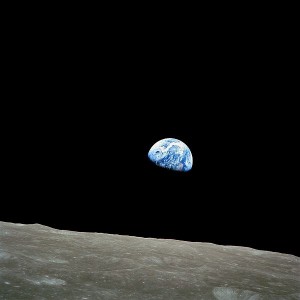The urge to expand wars in the Middle East, rather than find pragmatic ways to tamp them down, is even more absurd when set against the potential for peaceful cooperation in the region and the desperate need for the world to address existential threats like global warming, as Winslow Myers notes.
By Winslow Myers
Nothing more clearly illustrates the absurdity of murder for political ends than this moment of chaos in Iraq and Syria. Imagine spaceships of an advanced alien civilization hovering over that vast desert area and assessing the state of our human endeavors on the basis of the welter of alliances and rivalries to-ing and fro-ing below, leaving trails of blood and traumatized children.
As borders arbitrarily set by colonial powers a century ago dissolve, the strategic hopes of strong nations are undercut by vicious tribal rivalries going back almost a thousand years. The so-called superpowers are paralyzed, helpless giants armed with useless nuclear weapons. Moral pygmies who initiated unnecessary wars based on shameless lies have the unmitigated gall to blame those in office for events the liars themselves set in motion.

The image of the Earth rising over the surface of the moon, a photograph taken by the first U.S. astronauts to orbit the moon.
Time magazine lays it out as clearly as possible in its June 30 issue; it boggles the mind: the U.S. and Iran support Iraq. Iran, Iraq and Shia militias support Assad. The U.S. and the Gulf States want to contain Iran and prevent it from going nuclear. The Gulf States, the U.S. and Sunni militants want to defeat Assad, but the U.S. and the Gulf States have also sent money and arms to extreme Sunni groups in Syria that intend future harm to the U.S.
The Kurds, Iran, the U.S. and Iraq want to defeat ISIS, even as the Kurds have benefited from the chaos created by ISIS. Millions of innocent citizens across the region have been displaced, their children hurt in every way, terrorized and starved, with doctors and teachers and business leaders unable to exercise skills essential to the web of civil society.
All of this bloodletting, confusion, and waste has the potential to get much worse because it is unfolding in the context of a planetary moment when our common future is at stake unless we humans can cooperate on a whole new level to find sustainable forms of food and energy.
Yet from the perspective of the spaceship, the trackless desert could also be seen as a resource of staggering possibilities. Solar arrays could transform the harshly abundant rays of the sun into power for desalinization plants, preventing future water conflicts. The same solar energy could manufacture hydrogen to power a vibrant economy, a Muslim renaissance.
Imagine if the trillions America spent on its Iraq misadventure had gone instead into building such a system. Halliburton, which took a reported $39.5 billion in war profits from that conflict, could have still made billions and actually have done something positive in that part of the world.
When it becomes this difficult to discern who are the good guys and who are the bad, the whole “us and them” paradigm blurs and fades into smoke. The common interest becomes, fundamentally, what’s good for children: Syrian, Iraqi, Kurdish, Iranian, Israeli, American.
Brought up short by the helplessness of being unable to distinguish between alliances and enemies, is this not the moment for us to say enough, how much greater proof do we need that war and murder never work? Instead, there is an all-too-pervasive climate of opinion in the American government-industrial-media complex that more war and murder are the only answer to war and murder.
How to respond to evil and chaos with something other than more evil and chaos is one of the great historical conundrums. But one part of the answer is the nature of this moment, in the largest perspective of the unfolding of geological time.
More and more of us are defining our primary identity not in terms of nation or tribe or religion, but instead in terms of the whole delicate, gorgeous, threatened planet now seen as the outcome of billions of years of evolutionary development. This is new, an encompassing story that has enormous potential to unite the diversity of humans into a larger community.
Meanwhile a hierarchy of needs still operates, and the primary need of the torn-apart Middle East is security, in the bare-bones form of simple cessation of slaughter.
It would make zero sense to approach a young, fiery Kalashnikov-wielding adherent of ISIS and plead that he look up at the stars: “Look at who you really are, a descendent of these trillions of galaxies. It is out of this one unfolding universe that our sacred texts of Islam and Christianity and Judaism arose. We are one species. Shia and Sunnis may have a long history of enmity, but go back far enough and they are one, polarized by abstract illusions of difference that are meaningless in terms of this astronomical creativity out of which you came.”
This felt sense of oneness is the great message that bears in upon us from both our biggest challenges and our biggest opportunities, challenges like ocean acidification, rain forest destruction or nuclear proliferation, opportunities for vast networks of communication and understanding represented by the Internet. Global climate chaos encompasses not just physical weather but spiritual weather as well.
Though the horrors of Iraq and Syria represent a sickening step backward from the possibility of reconciliation among the tribes and religions of the world, the context of reconciliation surrounds us and points the way ahead, supporting and guiding our creativity toward a world that works for everyone. Great possibilities are known, but the wrong voices are loudest. Let us listen for the smarter, smaller, softer, kinder ones.
Winslow Myers, author of Living Beyond War: A Citizen’s Guide, writes on global issues for PeaceVoice and serves on the Advisory Board of the War Prevention Initiative.

Show Comments